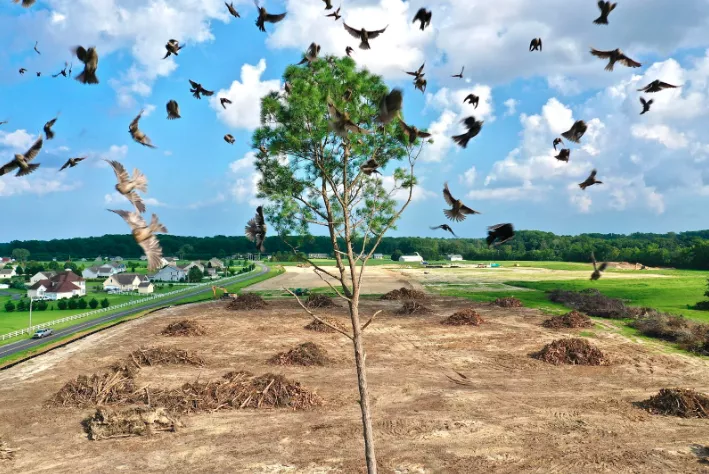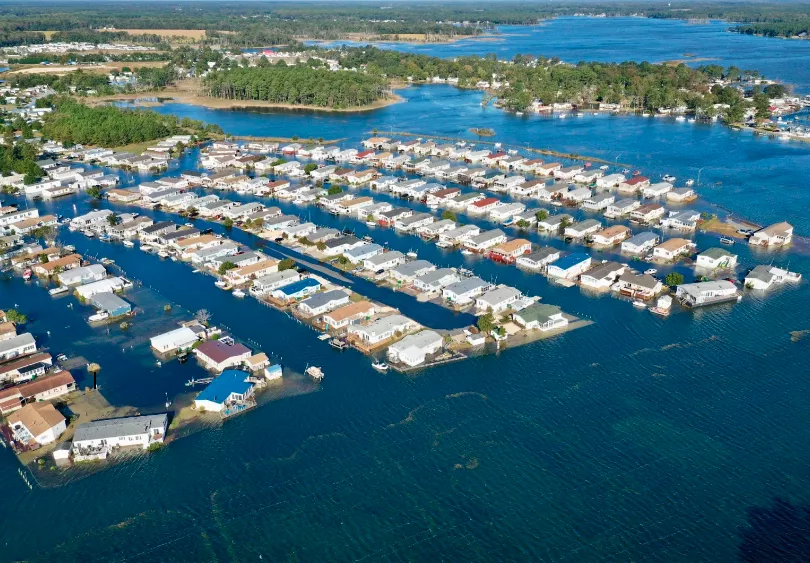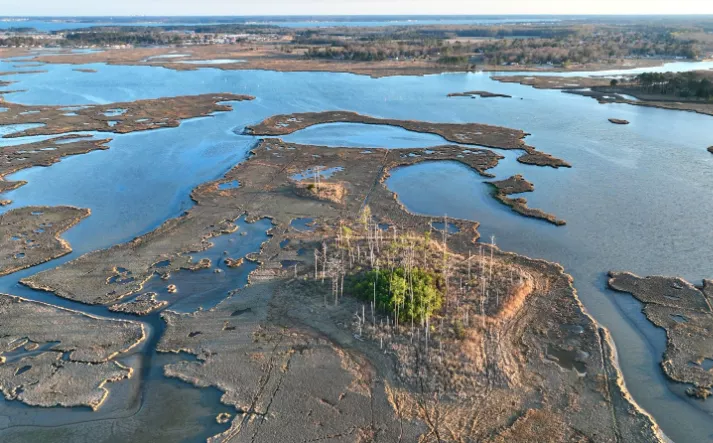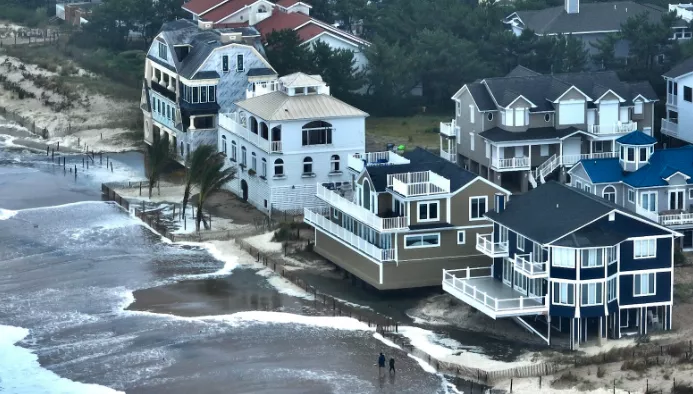By Greg Layton

Preparation for the construction of Headwater Cove near Lewes removed even more forest from Sussex County. Maintaining healthy forests helps absorb climate-altering carbon dioxide and reduces the likelihood of erosion as sea levels rise and extreme weather events increase. Photo Credit: Chris Driscoll
Your first opportunities to weigh in:
- 4 p.m., Tuesday, Oct. 22, at the Modern Maturity Center in Dover
- 4. p.m., Tuesday, Oct. 29, at the CHEER Community Center in Georgetown
- 4 p.m., Wednesday, Oct. 30, at the Route 9 Library and Innovation Center in New Castle
We’re all in this together. From climate change to disease and the direct and indirect financial costs of both, the consequences of burning fossil fuels to power human activity affect everyone. So, the Sierra Club Delaware Chapter believes everyone should engage—and be engaged—in finding solutions. As Delaware prepares to update its Climate Action Plan, a playbook for how the state prepares for climate change, we are working to ensure policymakers agree on the biggest issues and actually follow through with real solutions.
In keeping with the Club’s commitment to environmental justice, we are especially pushing the Department of Natural Resources and Environmental Control (DNREC) to seek the input of the historically underrepresented groups that fossil fuels harm disproportionately. The Chapter, along with its partners, pushed hard on the sponsors of the Climate Change Solution Act, to ensure DNREC did public outreach before any plans were written and strategies developed, particularly with attention to these historically impacted communities and those on the front lines of climate change. We know that a vigorous community engagement campaign is not only the just and equitable thing to do but the best way to ensure success in the future.

Mariner’s Cover on Long Neck Road in Sussex County flooded in 2019, as happens increasingly often in Delaware. Climate change drives sea level rise, which puts communities at risk. Photo Credit: Chris Driscoll
The 2025 plan could be pivotal
The process leading up to the 2025 Climate Action Plan is already underway.
The Delaware Department of Natural Resources & Environmental Control only updates the plan every five years, so getting involved now is extremely important as the planet rapidly approaches irreversible harm. The next chance to update the plan might be too late.
The U.N. Intergovernmental Panel on Climate Change predicts we will reach that point within the next decade as global temperatures surpass 1.5 degrees Celsius (2.7 degrees Fahrenheit) above preindustrial norms – unless we immediately change how we power human activity and use our land.
As the nation’s lowest-lying state, Delaware is exceptionally vulnerable to the harms wrought by climate change, and we already see them. Streets and roads between Coastal Highway and Wilmington now flood so frequently that the Delaware Department of Transportation expects to spend nearly $1.5 billion to raise them. Saltwater intrusion from sea level rise is killing forests and crops, and the increasing number of extremely hot days is threatening lives. A complete inventory of how climate change harms Delaware would require a much longer piece.
However, according to a study by Industrial Economics, Inc., the effects of climate change will likely cost the First State nearly $70 billion over the lifetimes of children alive today. For context, the State of Delaware’s 2025 budget, including capital and operating expenses, is just over $7 billion.
Fortunately, as Benjamin Franklin said, an ounce of prevention is worth a pound of cure. A study published in Nature predicted that preventing global temperatures from reaching 2 degrees Celsius (3.6 degrees Fahrenheit) above preindustrial norms could save the world economy as much as $20 trillion by the end of the century. We can mitigate the human, environmental, and financial costs of the looming crisis. But we have to invest in prevention and resilience in the present—and that means now.

Saltwater intrusion driven by rising sea levels kills forests and wetlands throughout Delaware, destroying native habits and leaving the land more vulnerable to erosion. The damage pictured here is progressing along Herring Creek. Photo Credit: Chris Driscoll
DNREC process to build on progress
Developing the Climate Action Plan will involve intense work throughout the coming year, but that work could produce substantial results. The 2021 plan, for example, inspired climate-friendly legislation and regulation, ranging from the Climate Change Solutions Act, which sets targets for greenhouse gas reduction, to Delaware’s requirement that vehicle manufacturers make an increasing number of zero-emission vehicles available for sale in the state. A quick note that bears repeating is that this requirement is on the manufacturers, not consumers, so the talk about a “gas car ban” is just not based in reality.

Sea-level rise will cause expensive damage, not just to beachfront properties like these homes south of Dewey Beach. Photo Credit: Chris Driscoll
The Sierra Club Delaware Chapter expects Delaware’s 2025 Climate Action Plan to guide even more progress. That work has begun. In October, DNREC held three workshops to gather ideas and suggestions from stakeholders, community groups, and individuals. The department is also holding technical meetings with sectors associated with resilience and emissions to create an initial inventory of challenges and opportunities. This winter, the department will use the data it is gathering to run models demonstrating the potential trajectory of emissions in the First State. Next spring, DNREC will share its modeling results and seek feedback on reducing carbon emissions and making the state more resilient. It will hold meetings with businesses and communities to discuss both. Throughout the planning process, the Climate Action Plan team will also seek opportunities to meet with stakeholders one-on-one or in small groups. DNREC will consider including this feedback in its published Climate Action Plan next year.
As climate champions, we must participate and encourage others to do so. Our generation and future generations depend on it.